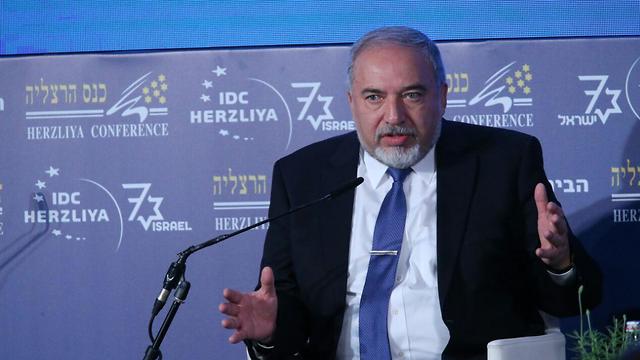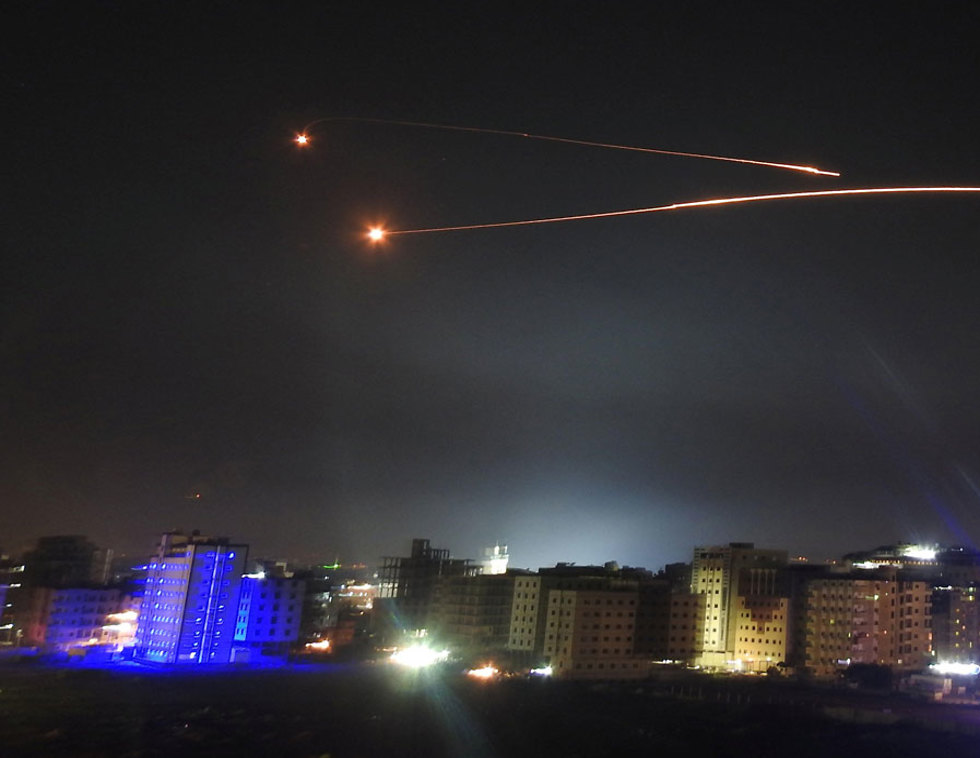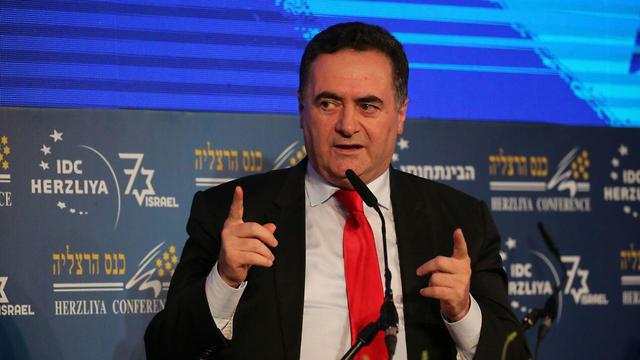

Lieberman says Israel hit 'almost the entire Iranian infrastructure in Syria'
Speaking at the Herzliya Conference, the defense minister addresses the Iranian attack on bases in the Golan Heights on Wednesday night and Israel's response; 'They must understand that if it rains here, it will pour there,' he warns.
"Iran is the one constantly trying to expand and create new proxies and fronts," Lieberman told the Herzliya Conference, addressing the escalation in Syria on Wednesday night following an Iranian attack on Israeli bases in the Golan Heights and the Israeli strikes against dozens of Iranian targets in retaliation.
"We hit almost the entire Iranian infrastructure in Syria," he said. "They must understand that if it rains here, it will pour there.
"Their activity isn't limited to the State of Israel," the defense minister added. "We see Iranians operating in Yemen, in Iraq, in Lebanon and in Africa as well. Iran is perhaps the only country today which represents extremism not only through ideology but also actively and with a willingness to sacrifice its own citizens and its future for the sake of that radical ideology."
Lieberman reiterated the IDF spokesperson's comments that not a single Iranian missile hit Israeli territory.
Lieberman was asked by his interviewer, Major-General (res.) Amos Gilad, former head of the Defense Ministry's Political-Military Affairs Bureau, where was Israel headed from here. "The elected president may be (Hassan) Rouhani," the defense minister replied, "but supreme leader (Ali) Khamenei is the one calling the shots. He holds the reins. We saw him deliver a blatant speech against the United States and (President Donald) Trump and we saw an Israeli flag being burned inside the Iranian parliament. That's the direction Iran is headed in today, unfortunately."
'We have no conflict with the Iranian people'
Addressing the possibility of a civilian revolt in Iran, Lieberman said: "The Iranian currency is collapsing, as is the entire economy there. Their fanatic regime is willing to sacrifice the young generation's future for this ideology. Last week, the Telegram (instant messaging service) stirred a row in Iran after Tehran blocked the app. There was a huge commotion. I hope that we'll eventually see changes in the Middle East, as well as in Iran's relations with the world and with Israel. We have no conflict with the Iranian people."
Lieberman said Syrian President Bashar Assad wasn't happy with the Iranian presence either. "His abilities are very limited. He is fighting for his survival and keeps murdering his citizens."
Asked whether Israeli should change their daily routine following the recent events, the defense minister said: "I would like to warn against complacence and smugness. This isn't an absolute victory. It's all limited to a conflict between us and the Iranian Quds Force in Syria. Everyone wants to limit the conflict to this slot. I'm sure that not everyone in Iran agrees with the Quds Force's activity in Syria.
"We have no interest in occupying Syria, we are not intervening in the civil war, we are not meddling with our neighbors' affairs. We hope that one day they'll stop talking about destroying Israel. We have no interest in escalating the situation, but we must be focused. We have a persistent enemy which has been trying to target us for years. This is a new stage and I say we have to remain cautious and modest and avoid getting carried away. I hope we have managed to end the new chapter of dealing with the Iranian extremism for now."
The defense minister sees another threat, this time from Lebanon. "There are bad news, and we have to pay attention. In the elections that just ended, Hezbollah basically completed its takeover of Lebanon. They say it was democratically elected? Hitler was democratically elected too. The Lebanese army is turning into a branch of Hezbollah and will operate directly through (Hezbollah leader Hassan) Nasrallah. It's a new reality. Like with the Iranians in Syria, we don't want to return to Lebanon and don’t want to build settlements there."
Lieberman added that "Israel is dealing with several conflicts simultaneously. With Hamas in the Gaza Strip, the friction isn't a reflection of Hamas' success but of its failure. Hamas has failed in managing the Gaza Strip, providing Gaza's residents with work and livelihood, which is why it's trying to divert the anger against us and shirk responsibility. They are talking about a grave humanitarian situation, but have invested in tunnels rather than in the health system, in electricity or water. The recent outburst of violence created by Hamas cost them over $20 million.
"There is a radical leadership here, like in Tehran, which is willing to sacrifice children for the sake of an extreme ideology to harm Israel. In the coming days they will try to provoke us and blame the violence on the US embassy move. We are prepared and will deal with the threats simultaneously. When we say we are prepared to solve the Gaza problem, we are telling them to give up their aspiration to destroy Israel and agree to demilitarization. That's something we won't compromise on."
As for the peace process in the region, the defense minister said: "In the modern world, to have a stable country with an ability to live in peace with its neighbors, we need a strong and successful middle class, like in Switzerland and Norway. There is no poverty there and no oligarchs, and 90 percent of the population belongs to a strong and successful middle class. In the Arab world, there is 90 percent poverty and lack of hope, and that's one of the problems. In a country like Yemen, where 60 percent are Sunni and the rest are Shiites, including Houthis, the majority of the population can't read or write. Clearly, it's difficult to reach stability with such a country."
Lieberman said he hopes Sunni Arab countries would "come out of the closet."
"Who supported (US President Donald) Trump's decision to withdraw from the nuclear agreement with Iran? Israel, Saudi Arabia and the Gulf states. So I think it's time for those moderate countries to 'come out of the closet' and start talking openly. Just like there's an axis of evil, it's time for the Middle East to also have an axis of moderate countries."
'A clear red line'
Transportation Minister Yisrael Katz, a member of the Political-Security Cabinet, told the Herzliya Conference on Thursday that the message of the Israeli strike in Syria was that Israel won't allow Iran to create a front against Israel.
"Tonight we painted the red line we have drawn in Syria in a clear red color with a clear message: Whoever crosses this line will be targeted. We won't allow Suleimani or Khamenei or anyone else fire missiles at the State of Israel and advance abilities in an attempt to threaten the Israeli front and home front. We won't allow Iran to built a front against the State of Israel in Syria. This is a clear message which was operationally implemented overnight in a really unusual and exceptional intelligence and IDF operation. This is a policy we have drawn as a red line and we stand behind it."
As for the possibility that the Iranians tried to bring long-range antiaircraft missiles into Syria, Minister Katz said: "I don't think we have reached that stage, but any missile ability aimed at disrupting the IDF's ability to act in the air or to threaten the Golan Heights, the Israeli home front, is an ability we will prevent and won't allow in Syria. This is a very clear line.
"We have to understand that there are three stages here. Iran has been in Syria for 20 years now to help Hezbollah and the Shiites. In the past seven years, it has reinforced its abilities to fight ISIS, it has brought Hezbollah in and it has done other things. As of last August, after ISIS was basically defeated in Syria, Iran started opening a front against the State of Israel, arming itself with offensive weapons, with defensive weapons, and bringing 80,000 to 100,000 Shiite militia soldiers from all over the Middle East to Syria to build an offensive model against Israel. That's something we won't allow."
Minister Katz was asked whether the Russians had given Israel the green light for the IDF's overnight operation in Syria. "The Russians don't really greenlight such operations," he replied. "There is no friction between us and the Russians. We don’t harm Russian soldiers, Russian abilities, and they don’t intervene and don’t stop Israel from acting. That shouldn’t be taken for granted. Russia isn't preventing the Iranian entrenchment, but it isn't stopping Israel from acting.
"Israel is determined and it has the intelligence abilities to locate the Iranian presence and the special operational abilities to act. It has basically created an Iranian dilemma: Either pull out of Syria or suffer the consequences and get dragged into a conflict. We won't invade Syria to get Iran out of there. In the end, Iran has to make the political decision, as a result of internal pressure from a public that is economically collapsing there because of the aggressive policy and the money being spent and the American sanctions on the way. At the end of the day, we have to break the Iranian desire to be here, to get Russia to put a bit more pressure to maintain stability and stabilize Syria, and to get the Americans to increase the pressure."
Asked whether the overnight strikes have ended of the current round between Israel and Iran in Syria, Katz replied: "The round hasn't ended yet. We're at the beginning of the road, but we made significant progress yesterday."


















